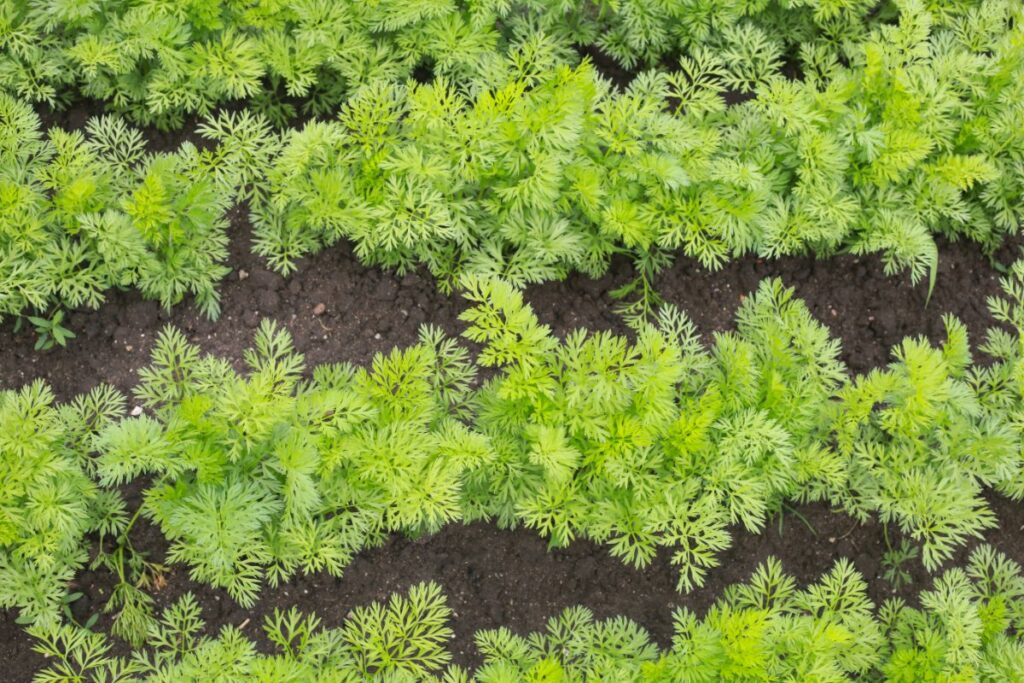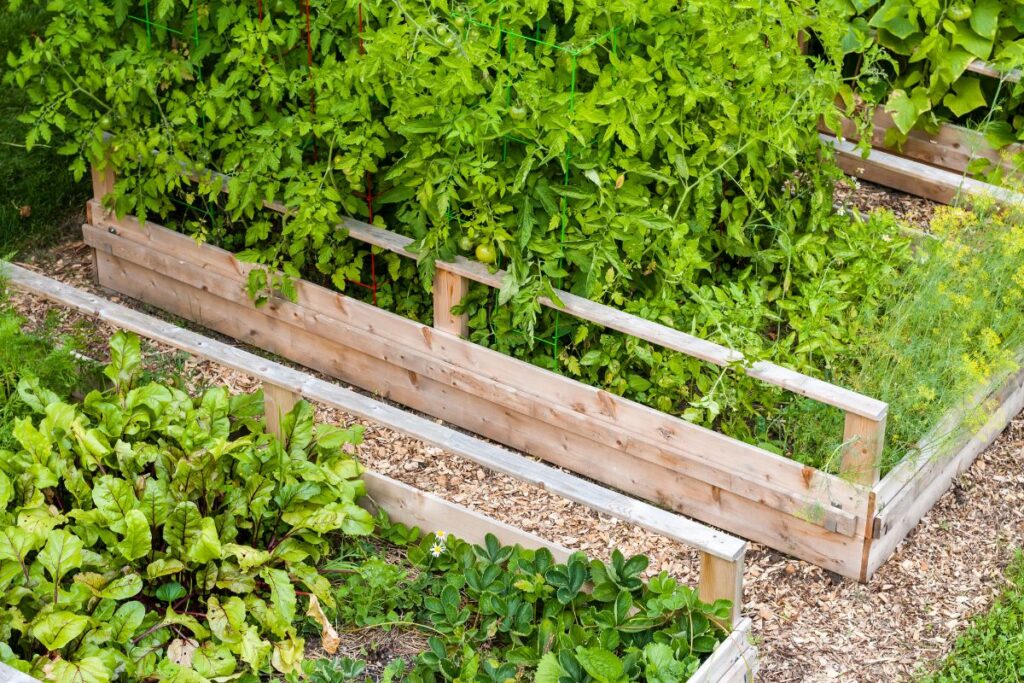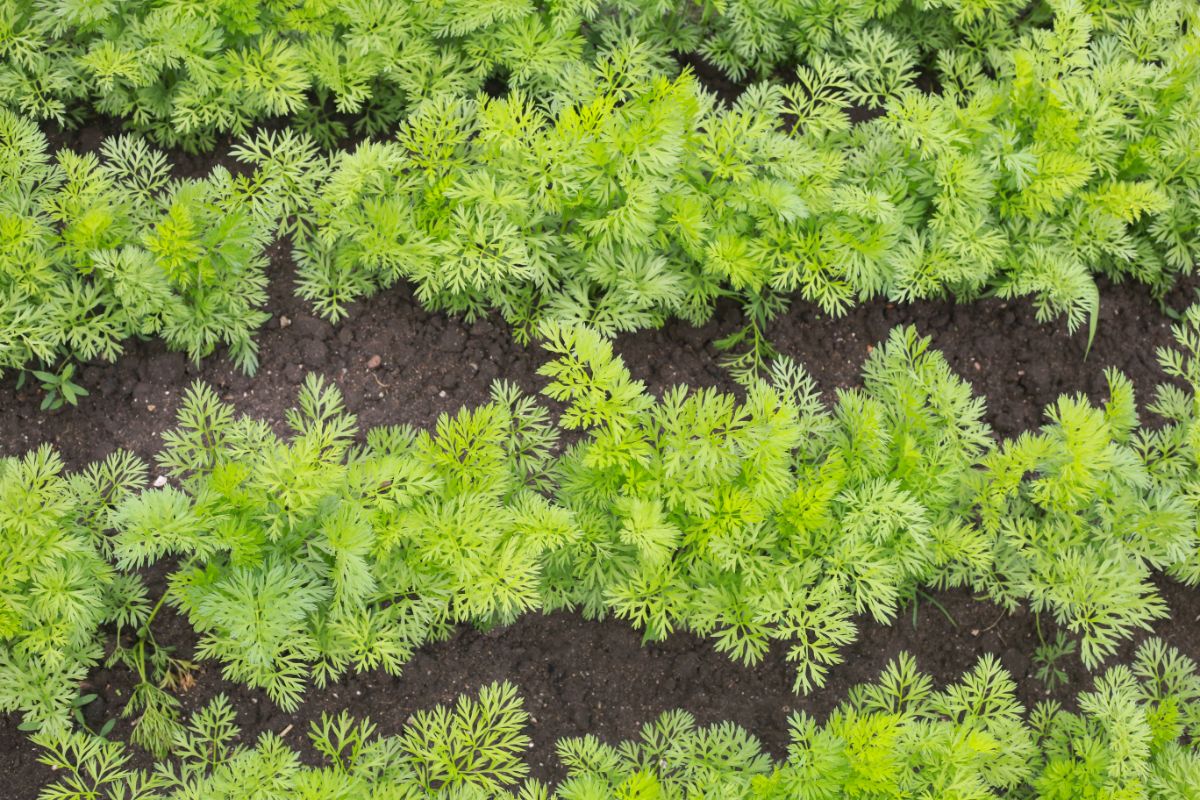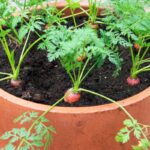Carrots – crisp, vibrant, and utterly delightful – have earned a place in the hearts of countless gardeners.
If you’re a gardener eager to take the plunge into carrot cultivation or have tried growing them before but didn’t quite hit the mark, you’re in the right place.
Welcome to my simple gardener’s guide on how to grow the best carrots in raised beds.

Let’s get into it.
Why Choose Raised Beds For Carrots?
First things first: why raised beds? If you’ve never considered raised beds for your carrot-growing adventures, you’re in for a treat. Raised beds offer a slew of benefits.
They improve soil drainage, provide better control over the soil quality, and make weeding and harvesting a breeze.
Carrots, in particular, thrive in well-drained, loose soil, which is precisely what raised beds provide.
Choosing The Right Location
Just like in real estate, location is everything in gardening. Carrots, being sun-loving vegetables, require at least six hours of direct sunlight each day to flourish.
So, choose a spot in your garden that receives ample sunshine. In addition to sunlight, consider your proximity to a water source; carrots, while drought-tolerant, appreciate consistent moisture, especially during germination and early growth.
Preparing The Soil
Now, let’s get down to the nitty-gritty: soil preparation. Carrots demand soil that’s loose, friable, and free from rocks or debris. Raised beds offer an advantage here, as you can control the quality of your soil.
Mix in well-rotted compost or aged manure to ensure your carrots get the nutrients they need. Aim for a pH level of 6.0 to 6.8, which is slightly acidic to neutral.
Sowing Seeds
When it comes to planting carrots, the adage “good things come to those who wait” holds. Start by planting your carrot seeds directly in the raised bed.
Aim to sow the seeds about two to three weeks before the last expected frost. This timing allows the seeds to establish themselves before the warm weather arrives.
Create rows about 12 inches apart and sow the seeds sparingly, spacing them about 2 inches apart within the row. Cover them with about ¼ inch of soil.
Remember that carrot seeds are tiny, and it can be a bit challenging to space them evenly, but don’t fret – you can thin the seedlings later if they become too crowded.
Carrot Varieties To Try
While I’m on the subject of carrot seeds, there are lots of different carrot varieties you can choose from to add more colour and vibrancy to your meals:
- Nantes: These are sweet, tender, and a classic choice for gardeners.
- Chantenay: Shooter and stubbier than Nantes, Chantenay carrots are ideal for heavy or rocky soils.
- Cosmic Purple: As the name suggests, these carrots are a brilliant shade of purple and packed with antioxidants.
- Parisienne: Tiny, round carrots that are perfect for containers or raised beds.
Thinning The Seedlings
As your carrot seedlings emerge, you’ll notice that they’re crowded and too close together. To ensure proper root development, thin them out. This means removing some of the seedlings to give the remaining ones enough space to grow.
Once the seedlings are a few inches tall, thin them so that they are 2-3 inches apart. This might seem counterintuitive, but it’s a crucial step to prevent stunted, twisted, or forked carrots.
The small, tender thinnings can be a delightful addition to your salad, so don’t let them go to waste.

Watering Carrots In Raised Beds
Watering carrots in raised beds requires a delicate balance. Carrots love consistent moisture but despise soggy conditions. Ensure your raised beds have proper drainage to avoid waterlogged soil.
Water your carrots deeply and evenly, aiming to keep the soil consistently moist but not waterlogged. This is especially important during the early stages of growth and when the weather is hot.
Mulching For Weed Control
Weeds are the bane of every gardener’s existence, but in raised beds, you can gain the upper hand.
Apply a layer of organic mulch, such as straw or shredded leaves, to help suppress weed growth. It also conserves moisture and maintains a more stable soil temperature, further benefiting your carrot crop.
Fertilising Carrots
Carrots are generally light feeders compared to other vegetables, but they still benefit from the occasional nutrient boost.
A light application of balanced, organic fertilizer, such as 10-10-10, when the plants are about four weeks old, can help promote healthy growth. However, avoid over-fertilizing, as it can lead to lush foliage at the expense of root development.
Pest And Disease Management
Carrots are relatively low-maintenance in terms of pests and diseases, but they can fall prey to Carrot Flies and aphids.
To deter these pests, you can use row covers or companion planting with aromatic herbs like rosemary and sage. Keep an eye out for signs of trouble, and address any issues promptly.
Harvesting Your Carrots
It’s time to harvest your raised-bed carrots! The ideal time to harvest depends on the carrot variety you’ve planted, but most carrots are ready for picking when they reach a diameter of around ¾ to 1 inch.
To harvest, gently pull the carrots out of the soil, taking care not to damage the roots. If you encounter resistance, use a garden fork to loosen the soil around them.
Frequently Asked Questions
The ideal time to plant carrot seeds in raised beds is about two to three weeks before the last expected frost. This allows the seeds to establish themselves before warmer weather arrives.
Water your carrots consistently to keep the soil moist but not waterlogged. This is especially important during the early stages of growth and hot weather. Ensure your raised beds have proper drainage to avoid waterlogged soil.
Final Thoughts
Growing your own carrots is as rewarding as it is satisfying.
With the guidance provided here, you’ll be well on your way to producing a bounty of crisp, colourful, and super tasty carrots in your raised beds.
- Can You Grow Bell Peppers Indoors? A Guide For New Gardeners - November 14, 2023
- Composting Basics: Can You Compost Mushrooms? - November 6, 2023
- A Gardener’s Guide To Growing Carrots In Raised Beds - November 1, 2023







